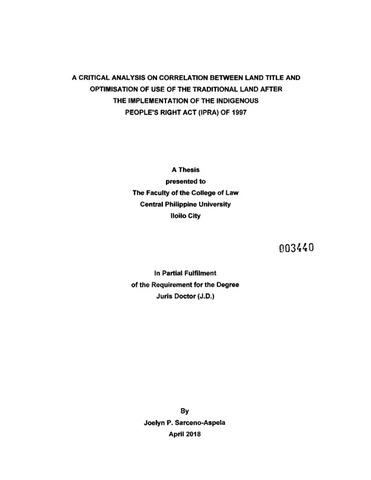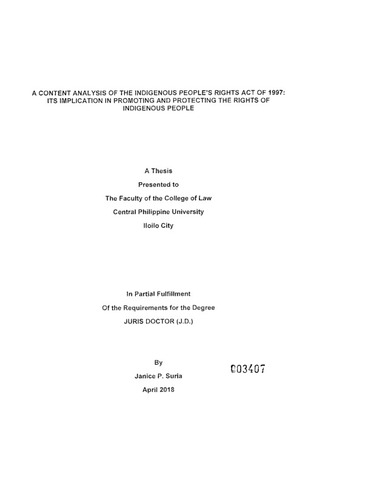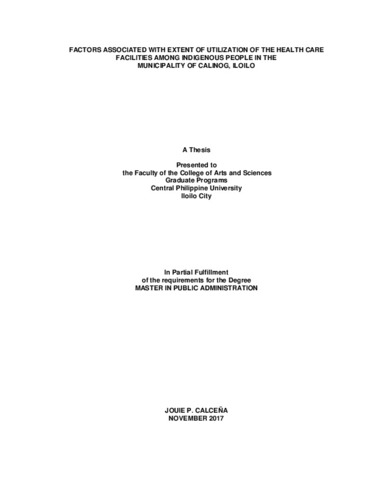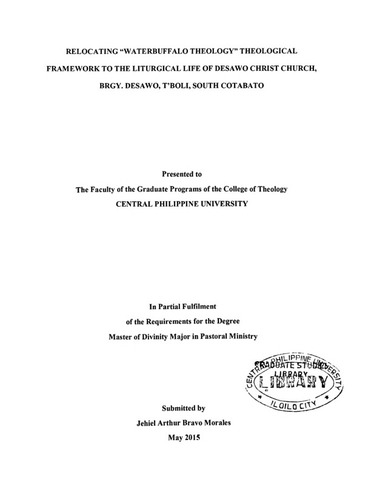A critical analysis on correlation between land title and optimisation of use of the traditional land after the implementation of the Indigenous People’s Right Act (IPRA) of 1997

Page views
1,206Date
2018Author
Thesis Adviser
Defense Panel Chair
Share
Metadata
Show full item record
Abstract
The fundamental development of indigenous people lies in the recognition of their rights to their traditional territories. This study was conducted to examine the experiences of indigenous communities after the recognition of their land rights by the State. It explores whether this recognition has enabled indigenous communities has enabled to achieved optimum use of their lands, whether the land is used for traditional and other purposes. Free prior and informed consent (FPIC) represents a critical tool in the realization of indigenous people land rights. Thus, a framework embodying the FPIC including the National Commission on Indigenous People (NCIP), the government agency responsible for developing and implementing policies and programs to protect and promote indigenous peoples’ right that influence the use of indigenous people territories was used for data collection and analysis.
The results reveal a contradiction in the outcome of the supposed ideals and intents of the formal title for the indigenous people. While it guaranteed them to live within their territories, the title has not allowed the realisation of other rights emanating from their title including the rights to fully access their lands and resources. Essentially, the positive gains of the title are lessened by the inadequate implementation of their land rights by the government, resulting to a continued denial of the exercise of the rights of the indigenous people.
Description
Abstract only
Suggested Citation
Sarceno-Aspela, J. P. (2018). A critical analysis on correlation between land title and optimisation of use of the traditional land after the implementation of the Indigenous People’s Right Act (IPRA) of 1997 (Unpublished postgraduate thesis). Central Philippine University, Jaro, Iloilo City.
Type
ThesisSubject(s)
Keywords
Department
College of LawDegree
Juris DoctorShelf Location
Law Library 340.72 Sa71 2018
Physical Description
vi, 64 leaves
Collections
- Juris Doctor [144]
The following license files are associated with this item:
Except where otherwise noted, this item's license is described as Attribution-NonCommercial-NoDerivs 3.0 Philippines
Related items
Showing items related by title, author, creator and subject.
-
A content analysis of the Indigenous People’s Rights Act of 1997: Its implication in promoting and protecting the rights of indigenous people
Suria, Janice P. (2018)This study was primarily conducted to analyze the content of The Indigenous People’s Right Act of 1997 (IPRA) to determine its implication in promoting and protecting the rights of indigenous people. It was conducted within ... -
Factors associated with extent of utilization of the health care services among indigenous people in the Municipality of Calinog, Iloilo
Calceña, Jouie P. (2017)This quantitative-descriptive correlational research sought to examine the factors associated with the extent of utilization of health care services of Panay-Bukidnon Indigenous Peoples in the Municipality of Calinog, ... -
Relocating "Waterbuffalo Theology" theological framework to the liturgical life of Desawo Christ Church, Brgy. Desawo, T'Boli, South Cotabato
Morales, Jehiel Arthur B. (2015)This study sought to relocate “Waterbuffalo Theology” to the worship life of the T’boli in Desawo Christ Church. Particularly, it sought to critically analyze on how Christianity have changed the T’boli people in their ...





